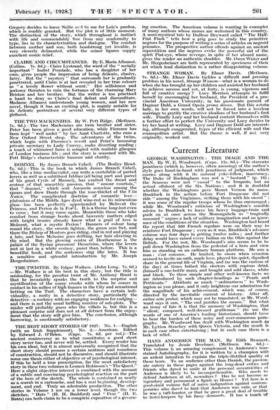Current Literature
. GEORGE WASHINGTON : THE IMAGE- AND THE MAN. By W. E. Woodward. (Cape. 12s. 6d.)—The staccato jauntiness (which is, however, often amusing) of the author's style goes hand-in-hand with jauntiness of Judgment, which Carries along with it its natural yoke-fellow inaccuracy. The Duke of Buckingham was not a " bastard " (p. 16) ; the Senecas were not " vassal " to the Iroquois, but .an actual offshoot of the Six Nations ; and it is doubtful whether the Washingtons gave Mount Vernon its name. Braddock in the action before Fort Duquesne did not ride " among the Virginians, striking them with his sword." : it was some of the regular troops whom he thus encouraged ; while Mr. Woodward's criticism of Washington's sensible advice to Braddock to leave his heavy baggage-train and push on at once across the Monongahela as " tragically unsound " argues a lack of military imagination and an ignor- ance of the conditions of the' situation. Washington had heard' the report that 500 French regulars were on their way' to reinforce Fort Duquesne ; even as it was, Braddock's advance- column was four days in getting twelve miles ; and further delay would have raised every Indian on the Ohio against the British. For the rest, Mr. Woodward's aim seems to be to pull down Washington from the pedestal of a hero and view him as standing on an ordinary human platform. He was a man : c'est convenu. He hunted, he swore when occasion seemed to invite an oath, made love, played his quiet, dignified share in the general life of Virginia, and (as was the custom of the day) at times bribed the electors with copious drink (himself a one-bottle man), and bought and sold slaves, white and black. To these simple and other well-known facts we are introduced by such chapter-headings as "'Pearls and Petticoats." Attribute as much " ordinariness " to Wash- ington as you please, and it only heightens our admiration for- the magnitude of his achievement, which was, of course, directed by the inevitable current of history. After all, exitus acta probat, which may not be translated, as Mr. Wood- ward says it can, " The end justifies the means." But what an irony of fate it is that the memory of Washington, that " silent, composed, well-dressed gentleman " (to use the words of one of America's leading historians), should have to • bear- the burden of these noisy and over-numerous pare-. graphs. Mr. Woodward has dealt with Washington much as Mr. Lytton Strachey with Queen Victoria, and the result is in each case often entertaining ; but in each case there is' a.
lack of relief.






































 Previous page
Previous page